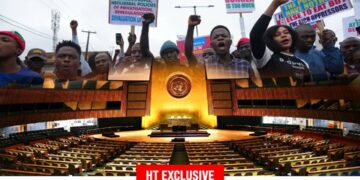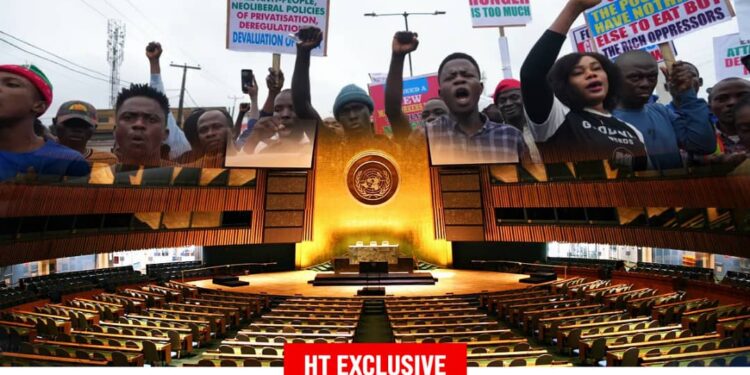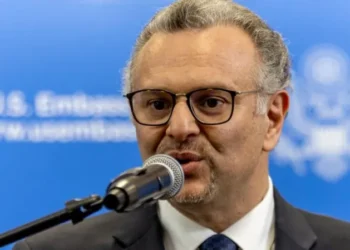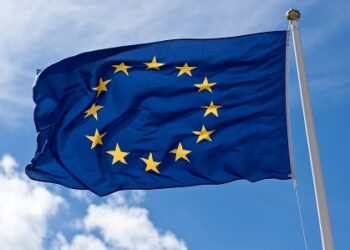By Enyichukwu Enemanna
As heads of state and government converge at the United Nations headquarters in New York for the 79th session of United Nations General Assembly (UNGA79) this September, to put efforts together towards accelerating progress in the actualisation of the 17 Sustainable Development Goals (SDGs), it is expected that leaders from the African continent will push for a common front in the search for solutions to nagging issues posing threats to the peace, stability and progress across nations.
The gathering presents a fertile ground for the continent through its umbrella body, the African Union (AU), to seek enhanced international cooperation to address pressing challenges such as insecurity, climate change, coup, poverty and inequality.
With the theme, “Leaving no one behind: acting together for the advancement of peace, sustainable development and human dignity for present and future generations”, delegates which will also comprise ministers, heads of government agencies and representatives of civil society organisations, will explore solutions to intertwined global challenges to peace, security, and sustainable development.
The continent’s socio-economic challenges highlighted in the escalating poverty index, burgeoning unemployment rate, infrastructural underdevelopment and political instability have left citizens frustrated and angered even as governments appear helpless to mitigate these challenges with solution-oriented policies.
Rapidly depleting living condition, poor access to health services and quality education are all commonplace in Africa, while gender inequality is also widespread throughout the continent. Through a collective and strategic push, the 54-country continent can douse the raging disappointment in the minds and faces of young persons who are hungry for improved governance system.
Raft of Protests
Several nations in Africa have recently had a tough time managing demonstrators who took to the streets to demand effective management of resources, increased investment in human development, reduction in waste, end to official corruption, people-centred economic policies, as well as end to ravaging insecurity.
While each protest is driven by unique interests, the Kenyan, Ugandan, Nigerian and Ghanaian struggling young demonstrators were united in their common demand for action against high inflation, lack of good jobs, poor transparency in governance and trust deficit among political class.
In Kenya, thousands of protesters hit the street from June 18 to vent their rejection of the controversial 2024 Finance Bill which sought to hike tax in a population already grappling with inflation. Beyond that, the protesters placed a demand on the government to address inequality, corruption, and a political system that only benefits the elite.
The anti-tax protests went beyond Nairobi where it started, crippling commercial and social activities in 43 of the country’s 47 counties where the demonstrations by the determined Gen-Z expanded to.
After demonstrators stormed the national parliament building in Nairobi on June 25 where vehicles were destroyed and the governor’s office set on fire, President William Ruto then announced that he would not sign the 2024 Finance Bill already passed by the parliament. Contained in the bill was new taxes on bread, diapers, and smartphones. Ruto also vowed to cut spending on public officials’ benefits and dozens of redundant state enterprises. He went ahead to announce the dissolution of his cabinet. Despite these measures, protesters remained in the street, instead calling for the resignation of Ruto.
Uganda, Nigeria and Ghana
Sensing the reality before him, President Yoweri Museveni, who has ruled Uganda for almost four decades, issued a threat that anyone planning to stage a protest in the East African country was “playing with fire”.
Young Ugandans mobilized support through the social media to march against series of allegations of corruption involving top government functionaries. Police had declined permission for the protest, and instead vowed to resist any demonstration that threatened Uganda’s “peace and security.” One of the main protest leaders responded by insisting that they would go ahead with it. “We don’t need police permission to carry out a peaceful demonstration. It is our constitutional right,” Louez Aloikin Opolose was quoted as saying.
They held placards with inscriptions such as “stop corruption” and calling the parliament a “den of thieves”. Another said: “We are peaceful protesters”. Earlier in the year, the UK and US imposed sanctions on a number of Ugandan officials, including parliament speaker Anita Among and three former or serving ministers, over alleged involvement in corruption.
In Nigeria, thousands across the West African nation on August 1 filed out in a protest tagged, #EndBadGovernance after days of suspense and momentum gathering on the social media space. The 10-day national protest among other things demanded a reversal of petroleum subsidy removal and a reduction in government spending (in frivolities). This was in response to the soaring costs of food and transport over the past year and a half, which have more than doubled in some cases since President Bola Tinubu assumed office.
The escalating economic pressure pushed more than 10 million additional Nigerians into poverty, according to the World Bank. Protesters blamed the crisis on the economic policies of Tinubu, which have included the subsidy removal on petrol and devaluing the naira, the country’s local currency.
“I saw what I never believed I could ever see in Jos,” says Isa El-Buba, a popular pentecostal pastor who led the protests in the North Central city of Jos. “These young people spoke with one voice.”
Arising from a court ban, the protest in Ghana did not witness much traction like the neighbouring Nigeria’s where social and commercial activities were disrupted in several cities especially in northern region. However, at the crux of agitation among the young population was high cost of living.
The organisers had demanded a drastic action from President Nana Akufo-Addo against corruption and nosediving living conditions, as well as to draw attention to delays in signing an anti-LGBT bill into law.
In Zimbabwe, the Zanu-PF government of Emerson Mnangagwa was quick to take over 100 activists into custody for fear they could stage a demonstration at the Southern Africa Development Community (SADC) hosted in the capital, Harare where Zimbabwe assumed the chairmanship of the 16-nation bloc, the first time since 1992 when it became a development community.
“Those are deviants, and they were dealt with properly. And we are very happy they failed. And they will never succeed again,” spokesperson of the governing ZANU-PF party, Christopher Mutsvangwa said while defending the government’s decision to detain the activists till the summit was over.
At the bottom line of these protests is lack of effective management, poor priority plan, over-stretched borrowing that were exacerbated by the COVID-19 pandemic, the knock-on impacts of the war in Ukraine, higher global interest rates among other factors.
They have perennially persisted that actual governance is being impacted in a way that generally affects the collective livelihood of the African populace, a continent naturally endowed with abundant under-the-earth resources to enhance the living standard of its people.
UNGA79 Demand List
The UNGA79 which commences September 10 should see the African Union (AU) court world leaders to rally support for the continent with interventions that could improve governance, reduce poverty, improve security, shore up the economy and solidify democratic rule.
African Leaders should demand for substantial global commitments and financial support for climate adaptation and mitigation efforts, especially given the disproportionate impact of climate change on African countries. Despite being the least contributor to global carbon emissions, at just 4 percent, the continent suffers the most from climate change. This is evidently seen in the drought ravaging most East Africa countries, affecting agriculture and food production. In West African sub-region, flooding has displaced communities, destroying their means of livelihood while erosion has had a devastating effect on infrastructure. A number of African young population who took to the streets recently would probably have engaged themselves in agricultural-related activities.
Also, African leaders should advocate for debt relief or restructuring at least to help nations manage their economic burdens and invest in sustainable development. Debt is a massive challenge for Africa. At the moment, at least 23 African countries are in financial distress, while others have defaulted on their debts. When a country defaults, the consequences are severe and far-reaching.
The continent should also push for fair trade practices and increased investment in African economies to foster growth and reduce poverty. The mining ecosystem remains hugely untapped despite huge potentials it contains. The recent discovery of historic 2,492-carat diamond in Botswana, the second largest in the world is a testimony that Africa incubates huge resources.
Also, Africa should call for increased support for health initiatives, including addressing pandemics, improving healthcare infrastructure, and supporting vaccination programmes. The Mpox currently threatening countries across Africa should be concerning enough to world leaders to the extent of making adequate provision for vaccines in order to mitigate its impacts.
Also, the long push for a permanent seat at the United Nations Security Council for Africa should not be forgotten at this August assembly. Lastly, the AU should seek for enhanced support for technological development and educational initiatives to promote innovation and capacity building.



































